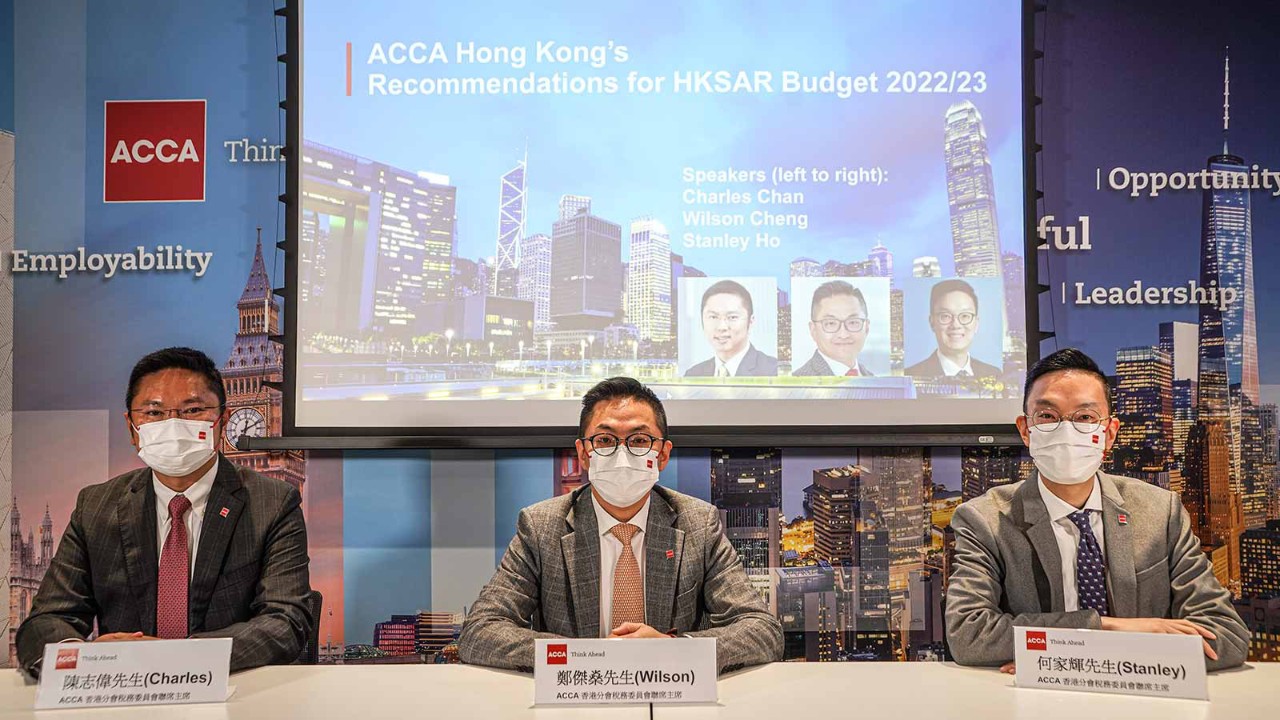
As Hong Kong grapples with the worst wave of Covid-19 infections yet, on 23 February, Paul Chan, the financial secretary of the Special Administrative Region (SAR), rolled out a HK$170bn package of Budget measures, including consumption vouchers, business and personal loan guarantees, aimed at boosting public confidence and keeping the business community afloat.
Cautioning that he is not optimistic about the SAR’s economic performance in the first quarter of 2022, Chan said that the government expects to return to the black with a surplus of HK$18.9bn at the end of the 2021/22 financial year. The projection is a reversal from an earlier forecast of a HK$101.6bn deficit.
‘We were pleased to see the government introduce measures to support the economy to drive a post-pandemic recovery’
ACCA Hong Kong’s tax subcommittee co-chairmen – Charles Chan, Wilson Cheng and Stanley Ho – give their views on the measures, and look at which recommendations from ACCA’s Budget submission were included.

In view of the current economic and social situation, how would you would you rate the Budget?
WC In general, the financial secretary delivered a bold Budget that addressed a lot of concerns. By doubling the value of the electronic consumption voucher issued last year from HK$5,000 to HK$10,000, available to about 6.6 million residents, the scheme will cost the government HK$66.4bn, but the multiplying spending effect will benefit Hong Kong’s entire economy. The only question is that if social distancing rules remain in place, it could require some flexibility on the effective period to maximise the positive economic impact.
SH While the pandemic is severely impacting Hong Kong, the financial secretary didn’t overlook the long-term growth needs. We should give him credit for introducing policies and setting aside financing to support family offices as well as the maritime and technology sectors. This is welcome because if Hong Kong rebounds as quickly as it did before the latter part of 2021, when the SAR was registering 6.4% GDP growth, business can be prepared to take advantage of these initiatives.
CC The Budget covered both short- and medium-to-long-term growth issues, including technology, innovation and the Greater Bay Area (GBA). Significantly, HK$5bn will be used to set up a GBA Investment Fund, which will focus on investment opportunities. The key issue is how quickly the funding and policies can be executed so that they are in place and ready to provide widespread benefits once the pandemic is brought under control.
Which areas of the Budget were you pleased to see aligned with ACCA’s recommendations?
WC There were a number of items where we saw alignment. The main one was the consumption voucher, which exceeded the HK$7,500 that ACCA recommended. Starting from the year of assessment 2022/23, we were also pleased to see the introduction of new tax-reduction relief measures for those who rent their homes while also having to pay salaries tax or tax under personal assessment. This has been put forward by ACCA for a number of years. The deduction is capped at HK$100,000 a year per person, and is projected to cost HK$3.3bn in government revenue.
‘Funding has been earmarked to support the innovation and technology sector, which ACCA has advocated’
CC We welcome the setting up of a HK$5bn GBA Investment Fund and the steps taken to increase integration with the GBA, which ACCA has long supported. Funding has also been earmarked to support the innovation and technology sector, which ACCA has advocated.
SH We were pleased to see the government introduce measures to support the economy to drive a post-pandemic recovery, especially for those industry sectors impacted the hardest by the pandemic: for example, the HK$1.26bn to support the tourism industry, which was in line with ACCA’s suggestion to support the tourism, hospitality and MICE [meetings, incentives, conferences and exhibitions] industries.
Did the Budget do enough to alleviate livelihood pressures?
CC While bringing the Covid-19 pandemic under control is top of the list of Hong Kong citizens’ priorities, the injection of HK$27bn into the Anti-Epidemic Fund is an important step towards reigniting the economy. For the first time, the sixth round of funding also includes support for the temporarily unemployed, which will help the public meet their imminent needs.
SH While the issuance of consumption vouchers and tax-burden relief measures will provide short-term relief, it is clear that bringing the pandemic under control, from both a financial and social perspective, is the main goal that will allow society to return to normal.
WC Taken as a package, the HK$10,000 electronic consumption voucher, HK$10,000 salary tax reduction and utility charge subsidies will go some way to alleviating livelihood pressures.
Which areas of the Budget will set the foundation for long-term development?
WC The new progressive rating system for domestic properties, which will mean that more expensive ones attract proportionally higher rates, is a small but positive step towards modernising the tax regime by widening the current narrow tax base. Proportionally higher rates will provide the government with a new component to relieve the reliance on salaries and profits tax and income from the stock market stamp duty.
CC To sustain long-term development, it is worth noting how the financial secretary set out various initiatives designed to upgrade workforce skills. These include financial support schemes for green and sustainable finance capacity building; creating 30,000 jobs; expanding upskilling opportunities by raising the subsidy ceiling of the Continuing Education Fund (CEF) to HK$25,000 per applicant; and removing the upper age limit.
‘An opportunity may have been missed to overhaul Hong Kong’s tax system and increase competitiveness’
SH In support of Hong Kong’s status as an international finance centre, the financial secretary introduced various policies to promote growth while protecting investors’ interests. Among others, initiatives include reviewing the listing regime to meet the fundraising needs of advanced technology enterprises, tax concessions for family offices, the issuance of additional green bonds and the expanding of global offshore renminbi products.
Which measures support the business community?
CC As SMEs work to emerge from the shadow of Covid-19, the government is extending access to the Special 100% Loan Guarantee Scheme for another year from June 2022. Taking into consideration that cashflow is crucial to SMEs’ survival, and rental payment constitutes a major part of their operating expenses, the government made a bold move banning landlords from terminating tenancies or taking legal action against business tenants from specific sectors for up to six months.
WC Barring landlords from terminating tenancies or taking legal action is a positive short-term measure to support SMEs. However, if the pandemic is not brought under control, businesses will still be facing the high cost of making rental repayments and additional measures will be needed to provide further support to SMEs.
SH A consideration for the future would be to introduce a tax loss carry-back scheme, which would allow SMEs to cash-out their tax losses to relieve cash-flow burden. ‘
What were the biggest missed opportunities in this Budget?
CC As suggested by ACCA, a reimbursement of the costs borne by employers to cover the current mandatory quarantine policy, which requires foreign domestic helpers to be quarantined in designated facilities, would relieve a burden on the middle class. This could be in the form of tax deduction for quarantine expenses.
WC Overall, the Budget provided something for everyone. However, an opportunity may have been missed to overhaul Hong Kong’s tax system and increase the SAR’s competitiveness, especially in terms of regional competition.
SH The financial secretary should be acknowledged for his creative Budget strategies in this and previous years. For example, the introduction of the electronic consumption voucher last year, which met with some scepticism, has since been widely welcomed by all sectors of the community. With this in mind, it was encouraging to learn that the financial secretary is studying various proposals submitted by the public including those by ACCA. The government should seriously consider offering financial relief for those who employ domestic helpers. It is an indisputable fact that domestic helpers could allow more people (such as full-time mothers and fathers) to join the workforce, which is crucial for Hong Kong’s future growth and development.




